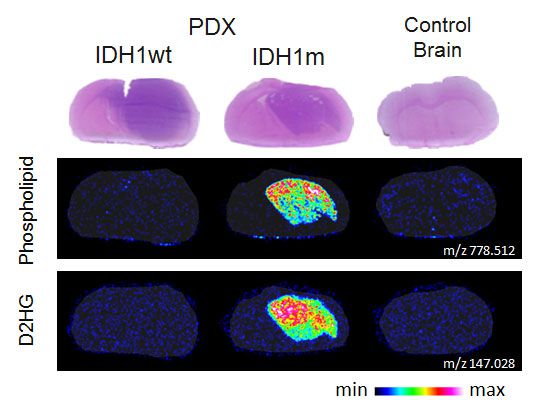Researchers from LIH’s Department of Oncology, together with international collaboration partners, characterised in depth the metabolic landscape of glial tumours carrying an IDH mutation, a mutation affecting the function of isocitrate deshydrogenase, a metabolic enzyme with crucial biochemical function.
Gliomas are aggressive and frequent brain tumours with a poor prognosis. Lower grade gliomas frequently acquire point mutations in the genes encoding isocitrate deshydrogenase 1 and 2 (IDH1/2). The presence of IDH1/2 mutations are a major determinant in the classification of diffuse gliomas and confer a more favorable disease evolution. IDH mutations lead to aberrant enzymatic activity and the extensive production of D-2-hydroxyglutarate, which interferes with cellular functions.
‘Recently, epigenetic changes linked to IDH mutations have been characterised, but metabolic alterations remain poorly understood. Therefore we aimed to further investigate the metabolic consequences of IDH mutations in vivo using complementary approaches: Mass Spectrometry Imaging (MSI) and Liquid Chromatography coupled to Mass Spectrometry (LC-MS)’, states Dr Fred Fack, scientist at the NorLux Neuro-Oncology Laboratory and joint first-author of the publication resulting from the present study.
Using MSI the researchers profiled the content and distribution of metabolites in mouse models with patient-derived glioma xenografts and in clinical glioblastoma samples with and without IDH mutation. In IDH-mutant glioma they revealed the deregulation of numerous biological pathways: an aberrant phospholipid metabolism, a reduced glucose turnover and lower energy potential, alterations in amino acid and neuropeptide levels as well as differences in antioxidant defence pathways. The scientists thus identified important metabolic abnormalities, of which some could be targeted to develop anti-cancer treatments.
The research work was published in open access in the prestigious journal EMBO Molecular Medicine. It stems from a collaboration between the NorLux Neuro-Oncology Laboratory and the Genomics and Proteomics Research Unit of LIH’s Department of Oncology, the Beatson Institute for Cancer Research (Glasgow, UK), ImaBiotech (Loos, France), Radboud University Medical Centre (Nijmegen, the Netherlands) and the University of Bergen (Bergen, Norway).
As a key collaborator in this work, the Contract Research Organisation ImaBiotech, that offers mass spectrometry-based services to pharmaceutical research to provide better drug efficacy and toxicity evaluations, held a webinar on 6th February 2018 to highlight the use of MSI in this particular study.
Information:
https://www.imabiotech.com/cro-on-oncology-mass-spec/
Link to Publication: Altered metabolic landscape in IDH‐mutant gliomas affects phospholipid, energy, and oxidative stress pathways

Example of results obtained with Mass Spectrometry Imaging: presence of phospholipids and D-2-hydroxyglutarate in mouse brain sections (IDHwt = no IDH mutation, IDHm = with IDH mutation)
